
Albert Sbragia considers American urban government as an investor whether for building infrastructure or supporting economic development. Over time, such investment has become disconnected from the normal political and administrative processes of local policymaking through the use of special public spending authorities like water and sewer commissions and port, turnpike, and public power authorities.
Sbragia explores how this entrepreneurial activity developed and how federal and state policies facilitated or limited it. She also analyzes the implications of cities creating innovative, special-purpose quasi-governments to circumvent and dilute state control over city finances, diluting their own authority in the process.

As the federal government has cut back its support for domestic services, state governments increasingly have been forced to assume a leadership position. In this book, prominent experts describe and analyze how state governments in the 1990s have coped with fiscal stress through changes in tax and spending policies, as well as through attempts to "reinvent government" by abandoning long-established policies.
In an era when state budgets verge on the brink of deficit, state governments face the difficult task of reconciling the public's wish for low taxes with its desire for increased services—better schools, improved health systems, more prisons. This volume provides both a comparative overview of the fifty states as they try to meet conflicting needs and incisive case studies of six states with a reputation for being national leaders—California, Connecticut, Florida, Massachusetts, Michigan, and Minnesota. It explores how much substance there is to claims that states were successful in developing innovative policies.
The Fiscal Crisis of the States draws upon research to analyze what is really happening in the state capitols. Boiling down the diverse experiences of various states into a number of important lessons, this book will be a valuable resource for academics, policymakers, and public administrators, as well as the general reader, to understand the reality of state fiscal policies.
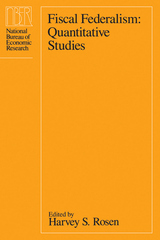
The first three papers study the distribution of power and responsibilities among the various levels of government. John Joseph Wallis and Wallace E. Oates look at the extend and evolution of decentralization in the state and local sector; Robert P. Inman examines the growth of federal grants and the structure of congressional decision making; and Jeffrey S. Zax investigates the effects of the number of government jurisdictions on aggregate local public debt and expenditures. The next three papers look at the deductibility of state and local taxes on federal tax returns. Using an econometric analysis, Douglas Holtz-Eakin and Harvey S. Rosen examine the effects of deductibility on revenue sources and level of expenditures. Lawrence B. Lindsey looks at how deductibility affects the level and type of taxation. George R. Zodrow uses a two-sector general equilibrium model to investigate revenue effects of deductibility. Finally, Charles R. Hulten and Robert M. Schwab analyze the problem of developing an accurate estimate of income for the state and local sector, finding that conventional accounting procedures have underestimated the income generated by a startling $100 billion.

Once hailed as a revolutionary change in U.S. federal aid policy that would return power to state and local governments, General Revenue Sharing was politically dead a decade later. Bruce A. Wallin now offers the only complete history of the General Revenue Sharing program — why it passed, why state and local governments used it the way they did, and why it died. He examines its unique role in the history of U.S. federalism and explores its relevance to intergovernmental aid policy at the turn of a new century.
This book is crucial to understanding the changed environment of U.S. intergovernmental relations in the 1990’s and makes a strong case for reconsidering a program of federal unrestricted aid.
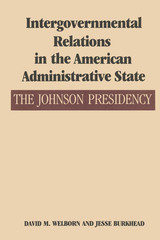
During the 1960s, President Lyndon Johnson and his administration substantially altered the structure of the American administrative state. Creating intergovernmental programs to forward the goal of the Great Society, they changed the contours of national-state-local relationships, and these changes largely have remained, despite the attempts of later administrations to reverse them. Intergovernmental Relations in the American Administrative State is the first comprehensive study of how and why these changes occurred.
Drawn from a wealth of primary material in the Lyndon Baines Johnson Library, the study probes the objectives of the president and other framers of new policies and programs, within the institutional and political context of the time. The authors give special attention to the inherent incongruities that arise when intergovernmental programs are used to address problems defined in national terms. In addition, they reveal how certain programs actually challenged the power of established national bureaucracies. They conclude with a thoughtful overview of the Johnson legacy in intergovernmental relations during subsequent administrations.


This book is the first comprehensive analysis of the politics behind the use of mandates requiring state and local governments to implement federal policy.
Over the last twenty-five years, during both liberal and conservative eras, federal mandates have emerged as a resilient tool for advancing the interests of both political parties. Revealing the politics that led to the policies, Paul L. Posner explores the origins of these congressional mandates, what interests and needs they satisfy, whether mandate reform initiatives can be expected to alter their use, and their implications for federalism.
This book reveals how mandates have changed the way policy is formed in the United States and the fundamental relationship between the federal government and the state and local governments.
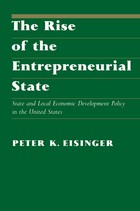
Eisinger’s meticulous research uncovers state and local governments’ transition from supply-side to demand-side strategies of market creation. He shows that, instead of relying solely on the supply-side strategies of tax breaks and other incentives to encourage business relocation, some governments promoted innovation and the creation of new business approaches.
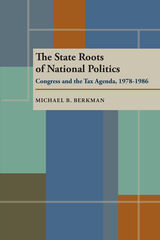
Winner of the William Anderson Award of the American Political Science Association
Explores the role of state politics in shaping the national agenda during the 1980s. By focusing on the federal tax policy from 1978-1986, Berkman argues that a conservative political agenda slowly replaced the liberal agenda dominant since World War II.
The state roots model asserts that national policymakers, particularly members of Congress, are products of their state political systems and environments. Berkman applies this model to the tax-cutting policies that took hold nationally in 1978, before Regan came to office, and continued in the tax acts of 1981 and 1986.
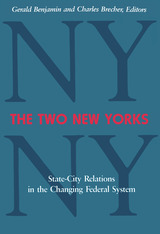
READERS
Browse our collection.
PUBLISHERS
See BiblioVault's publisher services.
STUDENT SERVICES
Files for college accessibility offices.
UChicago Accessibility Resources
home | accessibility | search | about | contact us
BiblioVault ® 2001 - 2024
The University of Chicago Press









